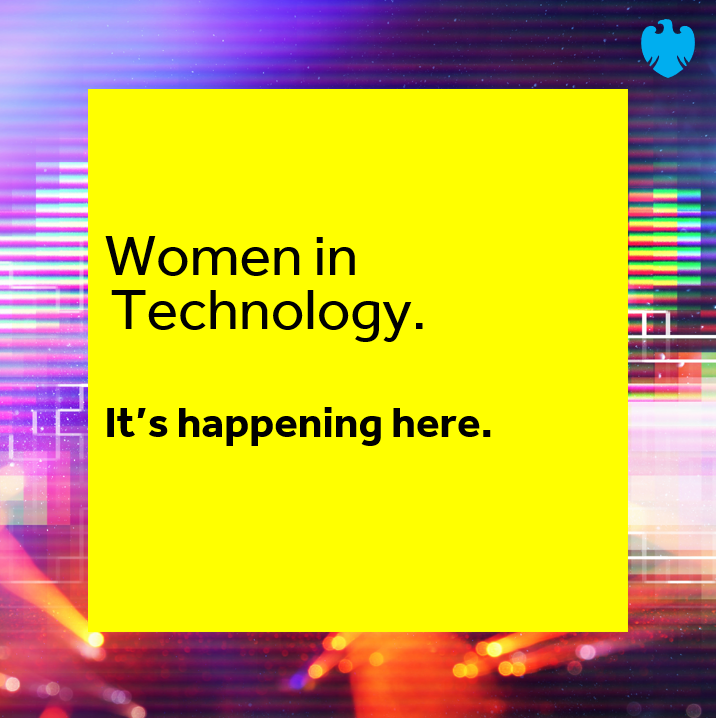
At Barclays, we’re very proud of the culture of inclusion and opportunity we offer our people. So we’re delighted to say that our Women in Technology (WiT) network has just won the WeAreTechWomen Network of the Year at the Tech Women 100 Awards. It was the icing on the cake during an evening when four separate Barclays women took home individual awards.
Alison Stanley, Anastasiya Kizima, Claire Bailey, and Robyn Townsend were celebrated for the remarkable work they do. And our WiT network was rewarded for growing the presence and skills of women in the technology industry.
“It’s nice to be recognised. This is a ‘side of desk’ project for all of us. And we do a lot! But it is so rewarding,” explains Faith Jamieson, the co-chair for WiT in London.
Look closer and you quickly find that, ‘we do a lot’ is a massive understatement. The WiT network has over 15,000 members across the company, from Northampton to New York and Pune to Prague. It aims to empower women of all levels and backgrounds to achieve their career aspirations in technology by offering its members, and local communities, networking, upskilling and collaboration opportunities.
Faith is a Programme Director in Corporate Technology. She’s been at Barclays for 12 years. Her co-chair on WiT’s London chapter is Amrita Langbour. Amrita joined Barclays six years ago, working within Investment Banking before taking on her current role as a Project Manager in Financial Crime Change.
Both of them say that it’s the diversity of opportunities and people that have kept them at Barclays. “I really enjoy the culture. The people on my team are fantastic. And I meet new colleagues every day. This is a fabulous place to be. Even the buildings are outstanding places to work,“ says Faith.
Amrita outlines the networks three core objectives:
It’s our goal to grow the presence and skills of women in our technology workforce. To inspire women, both internally and externally, to consider a career in technology. And to retain and train our internal female tech talent.
As Faith explains, that means running multiple, diverse initiatives at once. “We have a really enthusiastic set of members, led by a very active organising committee and some great support from our WiT Male Allies. We run all kinds of events from Ada Lovelace and Grace Hopper celebrations to CodeFirst Girls, hackathons and coffee mornings.
The global network also provides a wealth of learning opportunities. These range from career coaching sessions to mentoring and masterclasses on subjects as diverse as DevOps, data science and digital currencies.
“The masterclasses are really popular. They give an insight into the leading tech topics of the day and open the doors to parts of the tech business you may not have encountered before. And if you can’t dial in live, we make the recordings available for members to access in their own time,” says Faith.
WiT is well-known for finding new and innovative ways to drive change and deliver value for Barclays and the talented women in our teams.
“One group of members made a series of myth-busting videos around roles in Architecture, dispelling the idea that you need a hardcore technical background to build your career in that discipline,” explains Amrita.
“In another project, we worked with the HR teams to produce a gender-neutral hiring guide,” adds Faith.
“It’s vital that we’re always looking to have an impact externally as well as internally,” says Amrita. “For a start, you don’t have to be in tech to join the network, you just need career aspirations in tech."
There are so many opportunities in technology, and they are so varied. We want to encourage women from across Barclays, and beyond, to explore their potential in tech.
WiT helps to promote job opportunities internally and run career spotlight panel events on internal mobility. The network presents at Early Careers sessions to encourage female Graduates, Apprentices and Interns to apply to Barclays. And it supports local schools and communities by hosting interactive learning sessions.
“We work with the Working Families network to train young students in the fundamentals of programming to encourage youngsters to consider a career in technology,” explains Faith.
Overall, the most important contribution that WiT makes might be giving visibility to the amazing women across Barclays’ tech business.
“When I started my career as a graduate, there weren’t many women in technology teams, and they tended to be in less technical roles. There were even fewer senior role models to look up to,” says Faith.
Amrita agrees. “I was only girl in my computer class at school.”
Fortunately, that is changing fast. “Now we’re almost at a 50/50 gender split across our junior roles. We have more work to do at the Assistant Vice President level and above. And that’s why it’s vital that our members get to meet and hear from the senior women at the top of our business globally,” says Faith.
No two people are the same. But broadly speaking, women seem to be more held back by imposter syndrome than men. So fostering confidence is vital in helping women to step up to more senior roles. Role models help younger people see what they can achieve. Especially when those role models are honest about the challenges they have faced.
Globally, the network has organised a number of female career panels featuring people at a range of levels. “The feedback has been great. Female leaders talking about their backgrounds and career journeys. The way they overcame challenges. Not always feeling super confident. Our junior members take huge heart and inspiration from those sessions,” says Faith.
“Providing support and encouragement is vital. Creating an environment where all women can enjoy long-term careers, whatever their choices about having a family. That starts with really practical stuff. Transparency about the opportunities and roles available. Visibility for the women excelling at them. Honesty about what those career journeys have really been like.”
That’s why WiT activities are regularly highlighted internally via curated newsletters and showcased externally via social media as #BarclaysWomeninTech on LinkedIn and Twitter. “That way everyone can see what’s possible when you work together and apply your collective energy,” says Faith.
That’s the other thing about being part of the network, it’s really rewarding to be part of something meaningful. And lots of fun. Both Amrita and Faith say that WiT has helped them to meet new people from across Barclays, all over the world, and in every discipline of technology. “All of us call on those networks in our day-to-day roles,” notes Faith.
Meanwhile, for more junior members, organising WiT events and initiatives is a big opportunity to step out of their daily roles and learn critical leadership, organisational and networking skills.
Amrita says this is one of her favourite parts of the Co-chair role. “I really enjoy supporting and guiding our more junior members to expand their horizons. We also have a number of people with little experience of managing events who have volunteered to lead some of our working groups. It can be a bit messy at first and they need some support. But Faith and I are careful not to step in too much. It’s wonderful to see them find their feet, flourish and grow.”
Talking about bright futures, Faith and Amrita have ambitions to work with the other WiT chapters across the globe to make the network even bigger and better.
"We have a fantastic platform to build on,” says Faith. “And Barclays as a whole is so supportive. If someone has an idea, this is their opportunity to run with it.”
“We’re always looking for new ideas. We want to do broader, more global events. We also want to do more focused, bespoke content. And we want to make more of the close partnerships we have with the other employee resource groups across Barclays,” explains Amrita.
That broader perspective is vital for the future says Faith.


